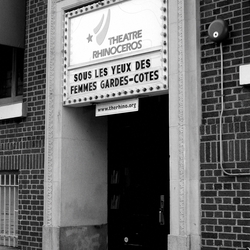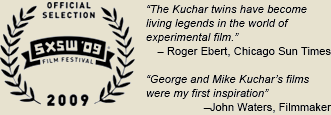Queer Sarajevo Festival 2008 – Documentary (in Bosnian w. English subtitles)
 The first Queer Sarajevo Festival (QSF) was scheduled to take place from September 24-28, 2008, in the capital of Bosnia and Herzegovina, coinciding with the Muslim holy month of Ramadan. The „city of tolerance and multiculture” framed the QSF as a „faggot’s provocation” and its organizers as „imported scum activists”. The government, subtly and verbally, hooligans and wahhabis, brutally and physically, stood on the same side – against the festival. The police was somewhere in between. QSF was opened leaving a dozen of people injured. Although it did not continue, it remains open, questioning the very nature of democracy in BiH.
The first Queer Sarajevo Festival (QSF) was scheduled to take place from September 24-28, 2008, in the capital of Bosnia and Herzegovina, coinciding with the Muslim holy month of Ramadan. The „city of tolerance and multiculture” framed the QSF as a „faggot’s provocation” and its organizers as „imported scum activists”. The government, subtly and verbally, hooligans and wahhabis, brutally and physically, stood on the same side – against the festival. The police was somewhere in between. QSF was opened leaving a dozen of people injured. Although it did not continue, it remains open, questioning the very nature of democracy in BiH.
The First Queer Sarajevo Festival (QSF) was organized by Organization Q. The aim of the QSF was to present ‘life stories’ of LGBTIQ persons – their daily lives, loves, relationships, friendships, families, activism, fears, and all other ‘life matters’ and questions with which LGBTIQ persons are confronted. In order to include queer theory, art and culture into Sarajevo cultural mainstream scene, Festival’s organizational team prepared five day program, including exhibitions, films (documentary and featured), round tables, and performances.
 Imagined as safe and free space, based on the principles of freedom, non-violence, self-definition and self-identification, Festival was publicly opened on 24th of September at the Gallery of the Academy of Fine Arts in Sarajevo, Bosnia and Herzegovina. Although protests against QSF were evident before its scheduled date, physical violence against the QSF, guests and organizers ensued at the opening ceremony. Violence was orchestrated and caused by several individuals and organized groups around the Academy as well as kilometers away. Minimum of ten persons was injured during that night, while the organizational team became a target of hate speech and threats received constantly a month before and after the opening of the Festival.
Imagined as safe and free space, based on the principles of freedom, non-violence, self-definition and self-identification, Festival was publicly opened on 24th of September at the Gallery of the Academy of Fine Arts in Sarajevo, Bosnia and Herzegovina. Although protests against QSF were evident before its scheduled date, physical violence against the QSF, guests and organizers ensued at the opening ceremony. Violence was orchestrated and caused by several individuals and organized groups around the Academy as well as kilometers away. Minimum of ten persons was injured during that night, while the organizational team became a target of hate speech and threats received constantly a month before and after the opening of the Festival.
Although the program of QSF was not implemented, the Festival itself was never officially closed, turning itself into a political struggle against violence, nationalism and fundamentalism in Bosnia and Herzegovina.
In the period from September 4th to October 3rd, 2008, Organization Q has filed twenty charges to the police authorities against NN persons who have participated in violence against guests and organizers of QSF.
Only two indictments have been raised thus far. The investigation is, allegedly, still under way.
Authors – Maša Hilčišin and Ćazim Dervišević
Producer – Organization Q (2009)
Donors – Embassy of the Kingdom of Netherlands in BiH, Embassy of Switzerland in BiH, Canadian Embassy in BiH, Global Fund for Women, Astraea Lesbian Foundation for Justice, Urgent Action Fund, OffStream, Heart and Hand Fund, and COC HIVOS.
Organization Q thanks all individuals, as well as local and international organizations who have publicly supported Queer Sarajevo Festival and the rule of law and human rights in Bosnia and Herzegovina.








